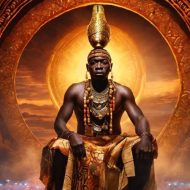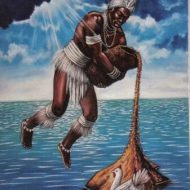Katonda : The Creator God
Listen
At a glance
| Description | |
|---|---|
| Origin | African Mythology |
| Classification | Gods |
| Family Members | N/A |
| Region | Uganda |
| Associated With | Creation |
Katonda
Introduction
Katonda is the revered name that the Baganda people, who primarily reside in modern-day Uganda, use to speak of their ultimate creator deity. In their rich tradition, Katonda is lovingly regarded as the father and guiding figure of the Baganda pantheon, which is affectionately referred to as the balubaale. Katonda, the creator god worshiped by the Buganda people of East Africa, is considered the father of the gods as well as the king and judge of the universe.
Physical Traits
Katonda, is typically portrayed as an unseen and all-encompassing entity. Nonetheless, certain accounts propose that he might assume a human-like guise, characterized by a deep complexion and a flowing beard. In addition, it is suggested that he could be adorned in a white robe and a regal crown, signifying his purity and commanding presence.
Family
In the Baganda traditional religion, Katonda is often considered the supreme and solitary deity, so he doesn’t have family members in the same way humans do. However, within the Baganda pantheon, known as the balubaale, there are other deities or spirits who are considered divine beings and have specific roles or attributes. These balubaale are not typically seen as immediate family members of Katonda but rather as part of the broader spiritual hierarchy or divine council.
Katonda is often regarded as the father and leader of the balubaale, symbolizing his role as the ultimate creator and protector of the Baganda people. While the relationship between Katonda and the other balubaale is more hierarchical than familial, it’s important to note that Baganda cosmology and religious beliefs may vary among individuals and communities, and there can be different interpretations of these relationships.
Other names
Katonda embodies many names and attributes in the Baganda tradition. He is known as Lissoddene, ‘the great eye’ in the sky. He is also referred to as Kagingo, ‘the master of life’; Ssewannaku, ‘the eternal’; Lugaba, ‘the giver’; Ssebintu, ‘the master of all things’; Nnyiniggulu, ‘the lord of heaven’; Namuginga, ‘the shaper’; Ssewaunaku, ‘the compassionate’; Gguluddene, ‘the immense one’; and Namugereka, ‘the distributor’.
Powers and Abilities
Katonda, in the traditional Baganda religion, is revered for possessing a wide array of powers and abilities that underline his role as the supreme creator god. One of his primary attributes is that of a creator, where he is believed to have brought the entire world and all living beings into existence. With his divine authority, Katonda has the remarkable power to shape and breathe life into all things, forming the very foundation of the Baganda people’s cosmology.
Central to Katonda’s identity is his omnipresence, a characteristic that signifies his constant presence throughout the universe. This omnipresence serves as a source of comfort and guidance for the Baganda, as it means that he watches over and maintains the balance of the world at all times. Additionally, his omniscience, the possession of all-encompassing knowledge and wisdom, allows him to comprehend the past, present, and future, imparting a sense of divine wisdom to his followers.
Katonda’s powers extend to the realm of protection, as he is perceived as the guardian and protector of the Baganda people. This role underscores his benevolence and compassion, as he cares deeply for the well-being of all living beings within his creation. As the ‘master of life,’ Katonda is intimately connected to the life force that sustains all creatures, further emphasizing his role as a nurturing and life-giving deity.
Beyond his protective qualities, Katonda is also seen as the lord of heaven, symbolizing his supreme authority and sovereignty over the spiritual realm. His divine authority extends to shaping the destiny of individuals and communities and apportioning blessings and fortunes, reflecting his intricate involvement in the lives of his worshipers. Lastly, some descriptions of Katonda emphasize his immense and awe-inspiring presence, as he is occasionally referred to as ‘the gigantic one,’ adding to the reverence and admiration with which he is regarded in Baganda tradition.
Modern Day Influence
African diaspora religions, which blend African spirituality with elements of Christianity and indigenous traditions, have also had an impact. Religions like Santeria, Candomblé, and Vodou involve the worship of deities or spirits, many of which have their origins in African religious traditions. These syncretic faiths have influenced art, music, and culture in the regions where they are practiced.
Additionally, educational initiatives aimed at preserving and promoting traditional African religious and cultural practices have gained momentum. Organizations and scholars work tirelessly to document and teach these traditions to younger generations, ensuring that they continue to be a vital part of African cultural heritage.
While traditional African spirituality and deities may not dominate mainstream pop culture, they remain an integral part of the cultural and spiritual fabric of many African communities. Their influence is growing, fostering a deeper appreciation for Africa’s diverse traditions and spiritual beliefs on a global scale.
Related Images
Frequently Asked Questions
What is lorem Ipsum?
I am text block. Click edit button to change this text. Lorem ipsum dolor sit amet, consectetur adipiscing elit. Ut elit tellus, luctus nec ullamcorper mattis, pulvinar dapibus leo.
What is lorem Ipsum?
I am text block. Click edit button to change this text. Lorem ipsum dolor sit amet, consectetur adipiscing elit. Ut elit tellus, luctus nec ullamcorper mattis, pulvinar dapibus leo.
What is lorem Ipsum?
I am text block. Click edit button to change this text. Lorem ipsum dolor sit amet, consectetur adipiscing elit. Ut elit tellus, luctus nec ullamcorper mattis, pulvinar dapibus leo.
What is lorem Ipsum?
I am text block. Click edit button to change this text. Lorem ipsum dolor sit amet, consectetur adipiscing elit. Ut elit tellus, luctus nec ullamcorper mattis, pulvinar dapibus leo.
What is lorem Ipsum?
I am text block. Click edit button to change this text. Lorem ipsum dolor sit amet, consectetur adipiscing elit. Ut elit tellus, luctus nec ullamcorper mattis, pulvinar dapibus leo.








